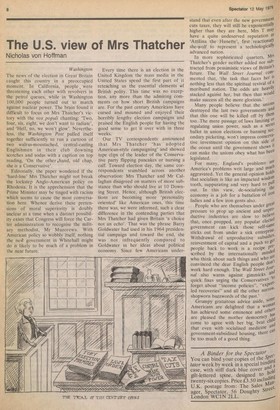The U.S. view of Mrs Thatcher
Nicholas von Hoffman
Washington The news of the election in Great Britain caught this country in a preoccupied moment. In California, people, were threatening each other with revolvers in the petrol queues, while in Washington 100,000 people turned out to march against nuclear power. The brain found it difficult to focus on Mrs Thatcher's victory with the vox populi chanting: 'Two, four, six, eight, we don't want to radiate', and 'Hell, no, we won't glow'. Nevertheless, the Washington Post pulled itself together sufficiently to run a cartoon of two walrus-moustached, central-casting Englishmen in their club downing scotches and sodas with a caption on top reading, 'On the other ,hand, old chap, she is a Conservative'.
Editorially, the paper wondered if the 'hard-line' Mrs Thatcher might not break the lockstep Anglo-American policy on Rhodesia. It is the apprehension that the Prime Minister may be tinged with racism which seems to cause the most conversation here. Whence derive these pretensions of moral superiority is doubly unclear at a time when a distinct possibility exists that Congress will force the Carter administration to recognise the military methodist, Mr Muzorewa. With American policy so wobbly itself, nothing the neia government in Whitehall might do is likely to be much of a problem in the near future. Every time there is an election in the United Kingdom the mass media in the United States spend the first part of it reteaching us the essential elements of British polity. This time was no exception, any more than the admiring comments on how short British campaigns are. For the past century Americans haye cursed and moaned and enjoyed their horribly lengthy election campaigns and praised the English people for having the good sense to get it over with in three weeks.
Our TV correspondents announced that Mrs Thatcher 'has adopted American-style campaigning' and showed tape clips of the leader of the Conservative party flipping pancakes or nursing a calf. Toward election day, the same correspondents stumbled across another observation: Mrs Thatcher and Mr Callaghan disagreed on matters of more substance than who should live at 10 Downing Street. Hence, although British elections are becoming more 'personality oriented' like American ones, this time there was, we were informed, such a clear difference in the contending parties that Mrs Thatcher had given Britain 'a choice not an echo'. That was the phrase Barry Goldwater had used in his 1964 presidential campaign and toward the end, she was not infrequently compared to Goldwater in her ideas about political economy. Since few Americans under stand that even after the new government cuts taxes, they will still be exponentiallY higher than they are here, Mrs T may have a quite undeserved reputation as `Attilina the Hunette', first reactioflarY she-wolf to represent a technologicallY advanced nation.
In more sophisticated quarters, Mrs Thatcher's gender neither added nor subtracted from pessimistic views of Britain's future. The Wall Street Journal commented that, 'the task that faces her is nothing less than the spiritual revival of a moribund nation. The odds are heavilY stacked against her, but then that would make success all the more glorious.' Many people believe that the unions destroyed the last two governments and that this one will be killed off by them too. The mere passage of laws limiting er regulating union power, such as a secret ballot in union elections or banning secondary picketing, won't impress conserva' tive investment opinion on this side of the ocean until the government shows tt can make the unions obey what has been legislated. For many, England's problems at America's problems writ large and Mt° aggravated. Yet the general opinion holds that socialism is like an impacted wisdorni tooth, suppurating and very hard to Pull out. In this view, de-socialising the economy is a job for a battalion of ilya ladies and a few iron gents also. People who are themselves under great pressure to prop up ancient and unPr°ductive industries are slow to believde that, once propped, any popular electe government can kick those self-same sticks out from under a sick enterprise' Withdrawal of unproductive subsidies; reinvestment of capital and a push to ge people back to work is a recipe Pre-el scribed by the internationally minde who think about such things and who at,e, convinced the dear English people don work hard enough. The Wall Street Jour] nal also warns against gimmicks al1! quick fixes urging the Conservatives 'Kt' forget about "income policies", "exP°1— led recoveries" and all the other narrow, shopworn buzzwords of the past.' rne Grumpy gratuitous advice aside, s°-1 Americans are delighted that a w°1113-5 has achieved some eminence and others are pleased the mother democracy come to agree with her big, brat chiluci that even with socialised medicine arl., government-subsidised housing, there ea" be too much of a good thing.


































 Previous page
Previous page